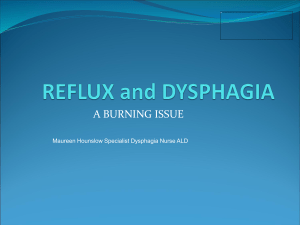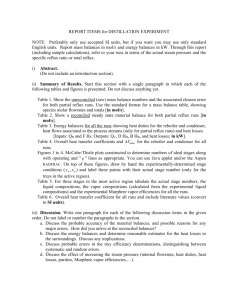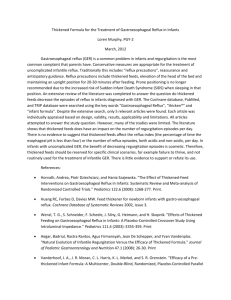RISA Checklist for medical consultations
advertisement
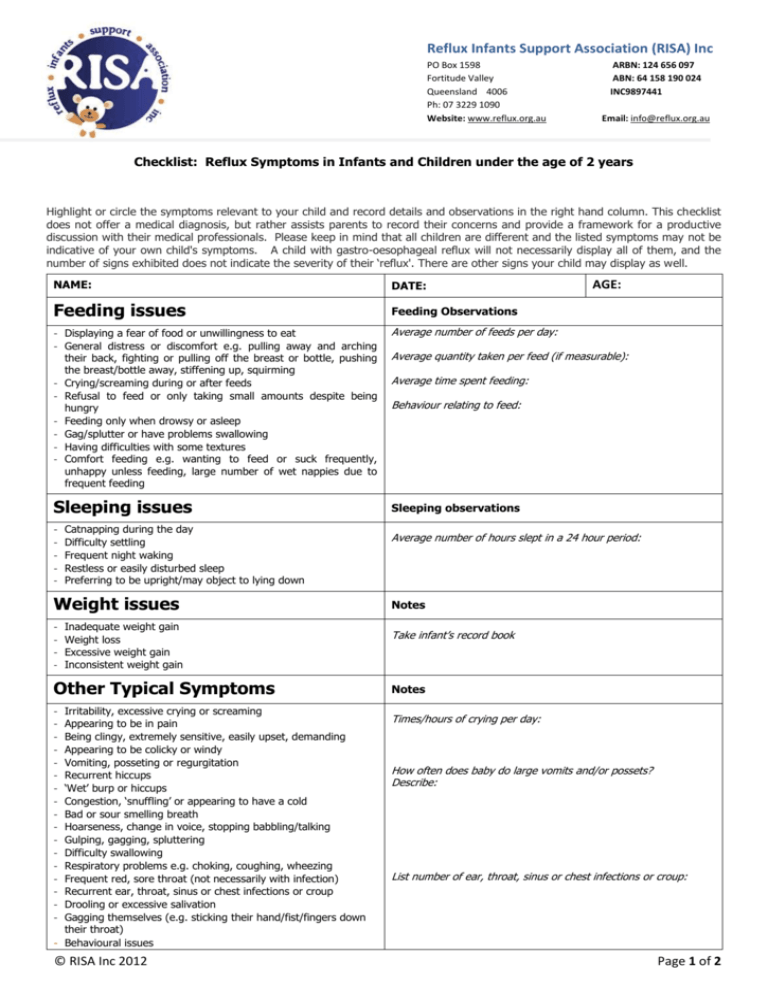
Reflux Infants Support Association (RISA) Inc PO Box 1598 Fortitude Valley Queensland 4006 Ph: 07 3229 1090 Website: www.reflux.org.au ARBN: 124 656 097 ABN: 64 158 190 024 INC9897441 Email: info@reflux.org.au Checklist: Reflux Symptoms in Infants and Children under the age of 2 years Highlight or circle the symptoms relevant to your child and record details and observations in the right hand column. This checklist does not offer a medical diagnosis, but rather assists parents to record their concerns and provide a framework for a productive discussion with their medical professionals. Please keep in mind that all children are different and the listed symptoms may not be indicative of your own child's symptoms. A child with gastro-oesophageal reflux will not necessarily display all of them, and the number of signs exhibited does not indicate the severity of their ‘reflux'. There are other signs your child may display as well. NAME: DATE: Feeding issues Feeding Observations - Displaying a fear of food or unwillingness to eat - General distress or discomfort e.g. pulling away and arching their back, fighting or pulling off the breast or bottle, pushing the breast/bottle away, stiffening up, squirming - Crying/screaming during or after feeds - Refusal to feed or only taking small amounts despite being hungry - Feeding only when drowsy or asleep - Gag/splutter or have problems swallowing - Having difficulties with some textures - Comfort feeding e.g. wanting to feed or suck frequently, unhappy unless feeding, large number of wet nappies due to frequent feeding Average number of feeds per day: Sleeping issues Sleeping observations - Catnapping during the day Difficulty settling Frequent night waking Restless or easily disturbed sleep - Preferring to be upright/may object to lying down Weight issues - Inadequate weight gain - Weight loss - Excessive weight gain - Inconsistent weight gain Other Typical Symptoms - Irritability, excessive crying or screaming Appearing to be in pain Being clingy, extremely sensitive, easily upset, demanding Appearing to be colicky or windy Vomiting, posseting or regurgitation Recurrent hiccups ‘Wet’ burp or hiccups Congestion, ‘snuffling’ or appearing to have a cold Bad or sour smelling breath Hoarseness, change in voice, stopping babbling/talking Gulping, gagging, spluttering Difficulty swallowing Respiratory problems e.g. choking, coughing, wheezing Frequent red, sore throat (not necessarily with infection) Recurrent ear, throat, sinus or chest infections or croup Drooling or excessive salivation Gagging themselves (e.g. sticking their hand/fist/fingers down their throat) - Behavioural issues © RISA Inc 2012 AGE: Average quantity taken per feed (if measurable): Average time spent feeding: Behaviour relating to feed: Average number of hours slept in a 24 hour period: Notes Take infant’s record book Notes Times/hours of crying per day: How often does baby do large vomits and/or possets? Describe: List number of ear, throat, sinus or chest infections or croup: Page 1 of 2 NAME: Is there a history of gastro-oesophageal reflux in your family? Yes/No In-home strategies you have tried DATE: AGE: Details: Notes To minimise reflux: Keeping upright for 30 mins after feed Feeding baby in more upright position Dummy Thickeners Avoiding tight clothing To calm a distressed baby: Swaddling for sleep White noise during sleep Carrier that keeps baby upright Infant swing Natural/over-the-counter remedies Diet Modification: Change to mother’s diet if breastfeeding Medical therapies you have tried Notes Other Concerns Notes Bowel motions (e.g. diarrhoea, constipation, mucous, blood, unusual colour, offensive odour) Skin rashes Posturing Allergies or intolerances Potential triggers for reflux flares e.g. crawling, teething, illness, recent vaccinations, constipation, being overtired or out of routine Medical recommendations © RISA Inc 2012 Describe any potential triggers that may be relevant: Notes Page 2 of 2
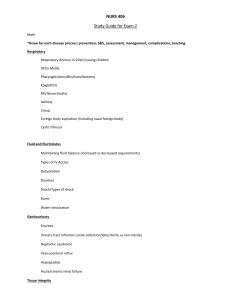
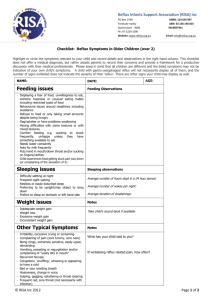
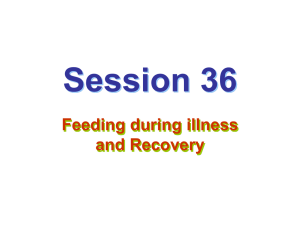
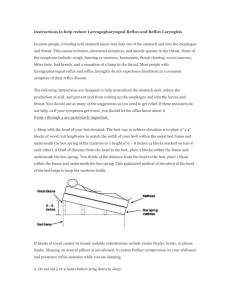
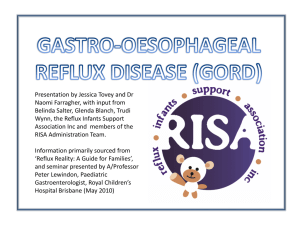
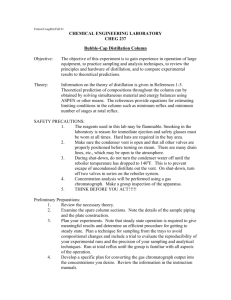
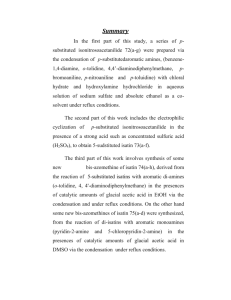
![Pediatric Gastroesophageal Reflux [10/29/2012]](http://s3.studylib.net/store/data/006891937_1-0f6e6daf80afae340b7d2470e47ece6c-300x300.png)
